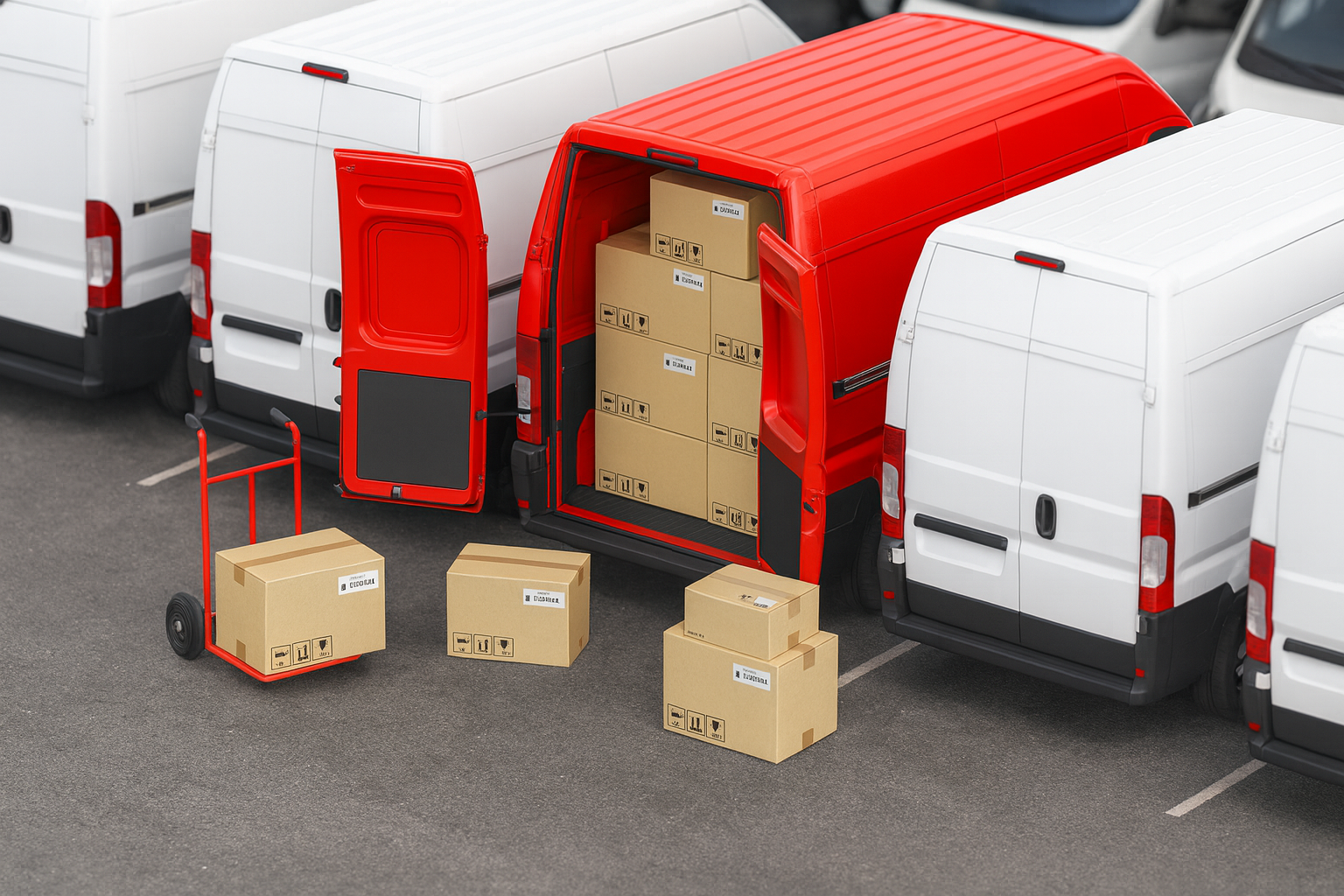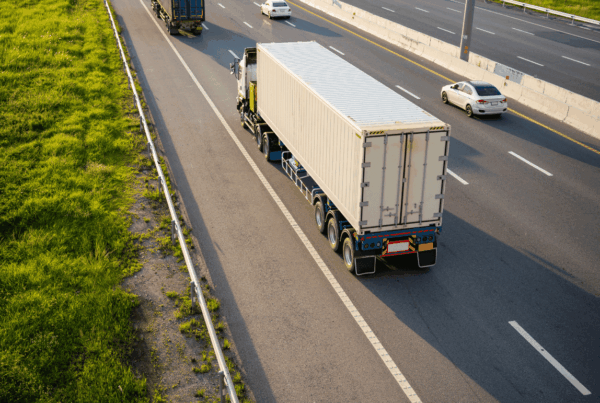In the transportation sector, where every shipment involves logistical, financial, and operational challenges, cargo insurance plays a key role. Whether by sea, air, road, or rail, each mode of transport exposes goods to potential risks such as theft, vandalism, damage, fire, or accidents.
Faced with these risks, companies have specific needs in terms of security and business continuity. This is where cargo insurance comes in: a solution designed to cover losses or damages that may occur during transit. In this article, we explain in detail what cargo insurance is, why it is essential, and how it adapts to the realities of modern transportation.
What is Cargo Insurance?
Cargo insurance is a specialized coverage that protects the value of goods during transportation, whether by road, sea, air, or rail. It represents an agreement between the shipper (the policyholder) and an insurer, intended to compensate for financial losses in case of theft, loss, or damage to the cargo while in transit.
Categories of Freight Insurance Coverage
In the field of cargo insurance, two main types of coverage are generally distinguished:
- Full Coverage: This provides extensive protection against most possible risks, such as theft, maritime accidents, or errors during loading operations.
- Partial Coverage: Less expensive, this option only covers specific incidents, often excluding cases such as damage caused by mishandling or inadequate packaging.
Transport, Distribution, and Logistics Services
Why is a cargo insurance policy important?
A cargo insurance policy is important because it protects goods in transit against various risks that may occur during transportation. These risks can lead to significant financial losses for companies, whether by ocean, air, road, or rail. Here’s why it is essential:
6 Benefits of Cargo Insurance
- Protection against loss and damage: Cargo insurance covers losses or damages to goods caused by unforeseen events such as accidents, theft, fire, shipwrecks, or natural disasters.
- Finncial security: In the event of a claim, insurance allows the shipper or owner of the goods to recover their value, thereby avoiding major financial losses.
- Contractual or regulatory obligation: Some international transactions or commercial contracts require cargo insurance. It is sometimes mandatory to secure financing or meet customs requirements.
- Limited carrier liability: Carriers often have limited liability. Insurance fills the gap between the actual value of the goods and the restricted compensation offered.
- Confidence and peace of mind: Having cargo insurance strengthens the security of logistics operations and reassures business partners about the reliability of the supply chain.
- Tailored coverage: Policies can be adapted to the specific needs of a company: type of goods, route, shipping frequency, etc.
Need a reliable logistics partner?
What Risks Does Cargo Insurance Cover?
Cargo insurance protects goods transported by sea, air, road, or rail against various risks that may occur during transit. It generally covers:
Main Risks Covered
- Total or partial loss of cargo: due to shipwreck, crash, road accident, container fall, etc.
- Accidental damage: harm to goods caused by shocks, crushing, overturning, etc.
- Risks linked to natural disasters: storms, floods, earthquakes, lightning.
- Fire or explosion during transport.
- Theft or maritime piracy (depending on the policy taken out).
- Risks during loading and unloading (breakage, falls, mishandling).
- War and strike risks: often optional, requiring a specific policy extension.
What Is Generally Not Covered
- Poor packaging or inadequate conditioning.
- Inherent defect of the goods (products that naturally deteriorate).
- Delivery delays (unless specified in the policy).
- Indirect financial loss (such as loss of market).
In summary, cargo insurance aims to protect against accidental, unpredictable, and external events that damage or destroy goods during transportation.
Why Work with a Freight Broker?
What Are the Main Types of Cargo Insurance?
Cargo insurance is essential to protect goods against the risks associated with shipping, whether by land, sea, air, or rail. Below are the main types of cargo insurance that companies can purchase to secure their shipments.
1. Land Cargo Insurance
Land cargo insurance protects goods shipped by truck or train, making it a very common solution for national and cross-border deliveries. It covers frequent risks such as road accidents, fires, theft, and damages occurring during loading or unloading. This insurance is particularly used by road carriers, distributors, and logistics companies that handle the daily movement of goods across the country or to neighboring markets.
2. Marine Cargo Insurance
Marine cargo insurance is essential to protect goods shipped by vessel, whether transported in containers or in bulk. It covers major risks such as shipwreck, collision, storms, cargo theft, or piracy, as well as particular and general average, including the voluntary sacrifice of cargo to save the vessel. Extensions of coverage can also include war risks, strikes, or riots, providing enhanced protection for international maritime shipments.
3. Air Cargo Insurance
Air cargo insurance covers goods shipped by air, a mode often chosen for urgent or high-value shipments. It protects against various risks such as plane crashes, damage during airport handling, as well as theft or loss of cargo. Some policies may also include coverage for delivery delays under specific conditions.
4. All-Risk Insurance (also called “Faculties Insurance”)
All-risk insurance, also known as faculties insurance, offers the most comprehensive protection for goods, regardless of the mode of transport used. It covers all possible material damages, except for specific exclusions such as inherent defects or poor packaging. Ideal for multimodal transport and complex international shipments, this insurance helps reduce disputes thanks to its clear, extensive coverage tailored to business needs.
5. Carrier’s Liability Insurance
This insurance covers damages to goods when the carrier’s liability is involved, usually in cases of fault or negligence. It is essential for carriers and freight forwarders to protect themselves against client claims. Its scope is often limited by international conventions, which regulate liability and compensation ceilings.
6. Ad Valorem Insurance
Ad valorem insurance is coverage calculated on the declared value of the goods, allowing for compensation equivalent to their actual commercial value in the event of a loss. It is particularly useful for high-value or sensitive goods and is often required in export and import contracts to secure international transactions.
Choosing the right type of cargo insurance is crucial to minimize potential losses and safeguard your logistics flows. Whether you ship goods by road, sea, or air, there is a solution tailored to your needs. For optimal protection, consider combining multiple types of coverage (e.g., all-risk insurance + carrier’s liability).
LTL Transport 101: How It Works and When to Use It
Cargo Insurance vs. Carrier’s Liability: What’s the Difference?
Carrier’s liability is a legal obligation that applies only if the carrier’s fault is proven (e.g., negligence, error). It is often covered by a policy such as Motor Truck Cargo (MTC) or an equivalent, which protects the carrier but does not guarantee full compensation for the client.
In fact, compensation is generally limited by contracts, applicable tariffs, national laws, and international conventions, and may even be calculated by weight—significantly reducing the recoverable amounts. Furthermore, the carrier may be released from liability by invoking exceptions such as force majeure, inherent defect of the goods, or inadequate packaging.
By contrast, cargo insurance (or goods insurance) covers the declared value of the shipment, usually including the invoice, freight charges, and possible markup, even in the absence of carrier fault. It therefore provides much broader and more direct protection for the owner of the goods, subject to the insurance contract terms, limits, and deductibles.
Key Differences Between Cargo Insurance and Carrier’s Liability
| Cargo Insurance (purchased by the shipper) | Carrier’s Liability (held by the carrier) | |
| Who is protected? | You (shipper or owner of the goods) | The carrier (against their legal liability) |
| Trigger for compensation | Damage or loss in transit (no need to prove fault) | Carrier’s fault or negligence must be proven within a specific timeframe |
| Basis of compensation | Declared value (e.g., invoice + freight + markup), subject to policy terms | Amounts limited by law, weight, contract, or applicable convention |
| Limits & exclusions | Deductible, exclusions defined by the policy (e.g., inherent defect) | Numerous exclusions + legal or contractual limits (often per kg/lb) |
| Control over coverage | You choose the type of coverage (all-risk or named perils), extensions, and insured amounts | You must accept the carrier’s conditions, with no ability to modify them |
| Predictability / Financial security | High: tailored coverage known in advance | Low: depends on context, contract, and the carrier’s legal defenses |
(CTA:Shipping Container Sizes: Complete Guide to Dimensions and Types
What Are Incoterms and Why Are They Important for Cargo Insurance?
Incoterms are international rules that define the respective obligations of the seller and the buyer in a sales contract, particularly regarding cargo transportation, costs, customs formalities, and the transfer of risks.
Although they do not govern the transfer of ownership, they have a direct impact on cargo insurance, since they specify who is responsible for the insurance and from what point the coverage must apply. Choosing the right Incoterm therefore helps allocate responsibilities clearly and avoid gray areas in the event of a claim.
Incoterms and Their Impact on Goods Transport & Insurance
| Incoterm | Who Pays for Main Transport | When Risk Transfers / Who Must Be Insured |
| EXW (Ex Works) | Buyer | As soon as the goods are made available at the seller’s premises → Buyer must insure |
| FCA (Free Carrier) | Buyer | Upon delivery to the first designated carrier → Buyer must insure |
| FOB (Free On Board) | Buyer | Once goods are loaded on board the vessel → Buyer must insure |
| CFR (Cost and Freight) | Seller | Once goods are loaded on board the vessel → Buyer must insure (seller pays freight but not insurance) |
| CIF (Cost, Insurance and Freight) | Seller | Once goods are loaded on board the vessel → Seller must provide minimum insurance for the buyer |
| CPT (Carriage Paid To) | Seller | Upon delivery to the first carrier → Buyer must insure |
| CIP (Carriage and Insurance Paid To) | Seller | Upon delivery to the first carrier → Seller must provide minimum insurance for the buyer |
| DAP (Delivered at Place) | Seller | At delivery, before unloading → Seller insures up to delivery |
| DDP (Delivered Duty Paid) | Seller | At delivery, after import customs clearance → Seller insures up to delivery |
At Trans-Inter Logistik, we can help you align your Incoterm, route, and type of goods with the right cargo insurance structure through accredited partners. This ensures coverage is in place at the right time, valuation complies with your contract, and all documentation is properly prepared to facilitate claims.
Bundle Insurance and Freight Services
How Does the Cargo Insurance Claims Process Work?
The cargo insurance claims process is a structured procedure that allows the insured (often a company) to request compensation following a loss or damage occurring during the transportation of goods. Below are the typical steps:
1. Receipt of goods and damage inspection
Upon delivery, goods must be carefully inspected. In case of visible damage or loss, it is crucial to immediately note it on the delivery receipt or any other transport document. This step is essential to establish the existence of the claim.
2. Notification to the insurer within deadlines
The insurer must be informed promptly, usually within the time frame specified in the policy (often 24 to 72 hours after delivery). A delay in reporting can result in denial of the claim.
3. Collection of required documents
To process the claim, several supporting documents are typically requested: the insurance policy, commercial invoice, transport documents (such as the bill of lading), letter of protest to the carrier, photos of the damage, and sometimes an expert’s report.
4. Claim review by the insurer
Once documents are submitted, the insurer examines the claim. They verify whether the event is covered under the policy, assess the carrier’s possible liability, and evaluate the amount of the loss.
5. Decision and compensation
After review, the insurer may approve or deny the claim. If approved, compensation is paid according to the contract terms. If denied, the insurer must provide detailed justifications to the insured.
Frequently Asked Questions: Cargo Insurance for Transport
Is cargo insurance mandatory?
Cargo insurance is not legally mandatory, but it is highly recommended. It protects against loss, theft, or damage to goods during transportation. Without insurance, the shipper alone assumes the financial risk in case of an incident.
Does it cover delays?
Cargo insurance generally does not cover delivery delays. It is limited to loss, theft, or physical damage to the goods. To be covered for delays, a specific policy such as carrier’s liability insurance is required.
When does coverage take effect?
Coverage typically applies from the departure warehouse to the arrival warehouse, beginning when goods are removed from storage for transport. It is essential to use appropriate transport methods to ensure the insurance remains effective.
Who should purchase cargo insurance?
In most cases, it is the shipper’s responsibility to insure the goods, but carriers can also purchase a policy on behalf of their clients. While not always mandatory, cargo insurance provides essential financial protection in case of loss or damage.
Simplify Your Freight Transport with Trans-Inter Logistik
Trans-Inter Logistik is a Canadian freight forwarder and broker that connects shippers with a wide network of certified carriers to ensure efficient delivery of goods across Canada, the United States, Mexico, and internationally.
We handle planning, booking, and end-to-end tracking of shipments by road, rail, sea, or air. By optimizing routes and rates, consolidating LTL shipments, and managing all documentation and customs formalities, we ensure smooth and transparent logistics. Clients are kept informed in real time, at every stage of the process.
Our team also coordinates specialized equipment and can arrange tailored cargo insurance in partnership with accredited insurers. With Trans-Inter Logistik, you benefit from a single point of contact, flexible transport capacity, reliable transit, and customized solutions from the origin warehouse to the final destination.







